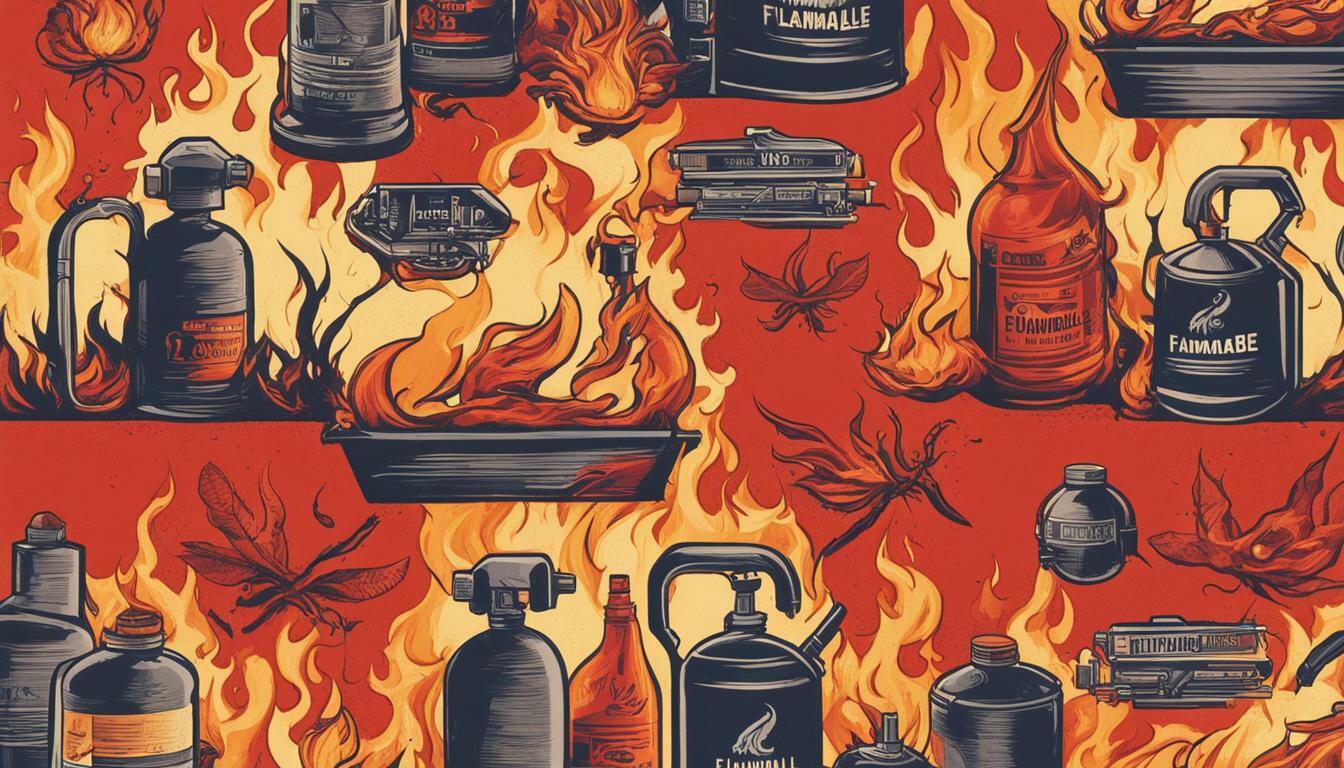
As a professional copywriting journalist, I understand the importance of safety measures in the use of pesticides. Flammability is a significant concern when dealing with pesticides, and it is crucial to know how to prevent accidents and protect yourself and those around you. In this article, we will explore the flammability of pesticides, the hazards associated with handling them, and the safety measures you can take to prevent accidents.
Key Takeaways:
- Understanding the flammability of pesticides is crucial for safe and effective use.
- Proper storage and transportation are essential to prevent accidents.
- Personal protective equipment (PPE) is necessary when handling flammable pesticides.
- Fire prevention strategies and having an emergency response plan are crucial for safety.
- Regulations and guidelines are in place to ensure the safe use and handling of flammable pesticides.
- Consulting experts or hiring pest control professionals can be beneficial for handling flammable pesticides.
Understanding Pesticide Flammability
When it comes to pesticides, flammability is a critical factor to consider. Understanding the chemical composition of these substances is essential in determining their potential for combustion and explosion.
Many pesticides contain highly volatile substances, such as solvents or petroleum distillates, which are susceptible to ignition when exposed to heat or an open flame. These substances can also form explosive mixtures with air, making them even more dangerous to handle.
Another critical factor that contributes to pesticide flammability is their flash point. The flash point is the lowest temperature at which a substance can vaporize and ignite. The lower the flash point, the greater the risk of fire or explosion.
It is essential to handle pesticides with caution, particularly when working in areas with potential sources of ignition. Always store them in a cool, dry place away from heat sources or direct sunlight. Additionally, avoid storing pesticides near flammable materials or in areas with poor ventilation.
It is also crucial to follow all safety measures outlined in the pesticide label, including wearing appropriate personal protective equipment (PPE) and establishing a clear emergency response plan. Failure to follow these guidelines can result in severe injury or even death.
Overall, understanding the chemical composition of pesticides and their potential for flammability is crucial in preventing accidents and protecting both homeowners and professionals from potential hazards.
Potential Hazards of Flammable Pesticides
When it comes to working with flammable pesticides, it’s essential to be aware of the potential hazards they present. These hazards can arise during storage, transportation, and handling of the pesticides. If proper precautions are not taken, accidents can occur, leading to injury, property damage, and even fatalities.
One of the primary hazards of flammable pesticides is fire. These pesticides contain combustible materials that can ignite if exposed to flames or high temperatures. If stored improperly, pesticides can also become a fire hazard, as they may come into contact with other chemicals or materials that can ignite.
Storage and transportation are critical factors when it comes to preventing accidents related to flammable pesticides. These pesticides should be stored in a cool, dry, and well-ventilated area away from direct sunlight and heat sources. It’s also crucial to keep flammable pesticides away from other chemicals, including oxidizers and corrosives.
When transporting pesticides, they should be placed in sturdy containers that are well-sealed to prevent spills and leaks. Transportation vehicles should also be designated for pesticide use only and equipped with appropriate safety equipment.
Another hazard to be aware of when working with flammable pesticides is toxic exposure. These pesticides contain chemicals that can be harmful to humans and animals if ingested, inhaled, or absorbed through the skin. Proper personal protective equipment (PPE) should be worn when handling pesticides to prevent exposure.
Overall, it’s crucial to handle flammable pesticides with care and to follow all necessary safety procedures. By doing so, we can avoid accidents, prevent harm to ourselves and others, and ensure that pesticides are used effectively and responsibly.
Safety Measures for Handling Flammable Pesticides
When it comes to handling flammable pesticides, safety measures are of utmost importance. It is essential to follow the safety guidelines set forth by regulatory bodies to minimize the risk of accidents and ensure the protection of both people and the environment. Here are some essential safety measures that should be followed when handling flammable pesticides:
- Personal Protective Equipment (PPE): Always wear appropriate PPE when handling flammable pesticides. This includes gloves, goggles, respirators, and protective clothing. It is crucial to select PPE that is approved for use with the specific pesticide you are handling.
- Proper Ventilation: Ensure adequate ventilation in the area where pesticides are being handled. This helps to reduce the concentration of fumes in the air and minimize the risk of fire or explosion.
- Proper Storage: Store flammable pesticides in a cool, dry, and well-ventilated area. Keep them away from heat sources, ignition sources, and oxidizing agents. Follow the storage guidelines provided by the manufacturer.
- Transportation: During transportation, it is essential to ensure that flammable pesticides are properly labeled, packaged, and secured. Use appropriate containers and follow the transportation guidelines set forth by regulatory bodies.
- Emergency Response Plan: Have an emergency response plan in place in case of accidental spills or fires. This should include contact information for emergency services and instructions for containing spills and extinguishing fires.
Remember, it is crucial to be cautious and follow all safety measures when handling flammable pesticides. By taking appropriate precautions, we can minimize the risk of accidents and ensure the safe use of these chemicals.
Fire Prevention and Control
When working with flammable pesticides, fire prevention should be a top priority. The risk of fire can increase when handling, storing, or transporting flammable pesticides. Therefore, it is essential to take necessary precautions to prevent fires from occurring.
One of the best ways to prevent fires is by having an emergency response plan in place. This plan should outline the steps to take in case of a fire and include contact information for emergency services, such as the fire department. All employees should be trained on the emergency response plan, and it should be regularly reviewed and updated.
Another crucial aspect of fire prevention is proper storage of flammable pesticides. Pesticides should be stored in cool, dry, and well-ventilated areas, away from any potential sources of ignition, such as heat, open flames, or electrical equipment. Storage areas should be clearly labeled, and access should be restricted to authorized personnel only.
Furthermore, when handling flammable pesticides, it is important to use spark-free tools and equipment. This includes using non-sparking shovels, hoes, and other hand tools, as well as spark-free electronic equipment, such as flashlights and radios. All equipment should be regularly inspected and maintained to ensure it is in good working condition.
Lastly, it is essential to have fire extinguishers readily available in case of an emergency. All employees should be trained on how to use fire extinguishers and should know the location of any fire extinguishers in the workplace.
Regulations and Guidelines
Regulatory bodies have put in place guidelines to ensure the safe use and handling of flammable pesticides. It is important to adhere to these regulations to prevent accidents and protect human health and the environment.
The Environmental Protection Agency (EPA) regulates pesticides in the United States. The agency requires all pesticide manufacturers to register their products and provide detailed information on their chemical composition, including their potential hazards. Before a pesticide can be sold, it must undergo a thorough review process by the EPA to ensure that it meets safety standards.
Many states have their own regulations and guidelines for the use and handling of pesticides. For example, some states require pesticide users to obtain certification or licensing before they can apply pesticides commercially or use them in certain settings, such as schools or hospitals. These requirements aim to ensure that users have the necessary training and knowledge to handle pesticides safely.
The Occupational Safety and Health Administration (OSHA) also provides guidelines for handling pesticides safely. OSHA regulations require employers to provide their employees with personal protective equipment (PPE) when working with pesticides and to train them on the proper use of PPE.
It is essential to keep up to date with the latest regulations and guidelines related to pesticide flammability and to follow them strictly. By doing so, we can ensure that we are using pesticides safely and responsibly, protecting ourselves and our environment from harm.
Professional Assistance for Flammable Pesticides
Dealing with flammable pesticides can be a challenging and risky task. While it is essential to take all necessary precautions, seeking professional assistance can offer an added layer of protection.
Experts in pesticides and their chemical compositions can provide valuable insight into handling flammable pesticides safely. They can suggest the proper storage and transportation methods, as well as the appropriate personal protective equipment (PPE) for different situations.
Hiring pest control professionals is another reliable option for dealing with flammable pesticides. These professionals have the training and experience necessary to handle hazardous materials safely. They can assess the situation, determine the most appropriate course of action, and provide effective solutions while adhering to safety guidelines and regulations.
Overall, seeking professional assistance is a wise choice when dealing with flammable pesticides. Their expertise can help prevent accidents and ensure the safe handling of these hazardous materials.
Safety Precautions for Handling Flammable Pesticides
As a professional copywriting journalist, I cannot stress enough the importance of taking appropriate safety precautions when dealing with flammable pesticides. It is essential to understand the potential hazards of such chemicals and follow the necessary safety measures to prevent accidents.
When handling flammable pesticides, it is crucial to wear appropriate personal protective equipment (PPE), including gloves, goggles, and a respirator. It is also advisable to avoid smoking or open flames in the area where the pesticides are being handled.
Proper storage and transportation of flammable pesticides are also vital in preventing accidents. These chemicals should be stored in a cool, dry place away from direct sunlight and sources of ignition. They should also be labeled accurately and kept out of reach of children and pets.
Fire prevention measures are crucial when working with flammable pesticides. It is recommended to have an emergency response plan in place, including fire extinguishers and a well-defined evacuation procedure.
Regulatory bodies have set forth guidelines and regulations to ensure the safe use and handling of flammable pesticides. It is essential to follow these guidelines and seek professional assistance, such as consulting experts or hiring pest control professionals, when dealing with these chemicals.
Conclusion
In conclusion, handling flammable pesticides requires proper safety precautions to prevent accidents. These measures include the use of personal protective equipment, proper storage and transportation, fire prevention, and adherence to regulatory guidelines and regulations. By taking these precautions, we can protect ourselves and our environment from the potential hazards associated with flammable pesticides.
FAQ
Q: Is pesticide flammable?
A: Yes, some pesticides can be flammable. It is important to take the necessary safety measures when handling and storing flammable pesticides to prevent accidents.
Q: What factors contribute to the flammability of pesticides?
A: The flammability of pesticides is influenced by their chemical composition and other relevant considerations. Some pesticides may contain highly volatile substances that increase their flammability.
Q: What are the potential hazards of flammable pesticides?
A: Flammable pesticides pose risks such as fires, explosions, and inhalation hazards. Proper storage and transportation are crucial to minimize these hazards.
Q: What safety measures should be followed when handling flammable pesticides?
A: When handling flammable pesticides, it is important to wear appropriate personal protective equipment (PPE), such as gloves, goggles, and fire-resistant clothing. Follow all safety guidelines provided by the manufacturer.
Q: How can fire prevention be ensured when working with flammable pesticides?
A: Fire prevention can be ensured by practicing good housekeeping, storing pesticides in a cool and well-ventilated area, and having an emergency response plan in place. Regularly inspect and maintain fire extinguishers.
Q: What regulations and guidelines are in place for the safe use of flammable pesticides?
A: Regulatory bodies have established regulations and guidelines to promote the safe use and handling of flammable pesticides. Familiarize yourself with these regulations and ensure compliance.
Q: Is it recommended to seek professional assistance for dealing with flammable pesticides?
A: Yes, seeking professional assistance, such as consulting experts or hiring pest control professionals, can provide the necessary expertise and help ensure the safe handling and management of flammable pesticides.
- Does Flea Treatment Kill Lice? - September 8, 2023
- Does Flea Treatment Kill Mites? - September 8, 2023
- How to Put Flea Treatment on a Dog? - September 8, 2023






